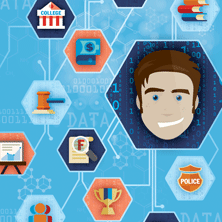 Big data is everywhere. The advertisements in your social media feeds and alerts of "potential fraudulent activity" from your bank are just a couple of examples of how big data applications are making their way into our everyday lives.
Big data is everywhere. The advertisements in your social media feeds and alerts of "potential fraudulent activity" from your bank are just a couple of examples of how big data applications are making their way into our everyday lives.
The private sector, including companies like Facebook and Google, isn't alone in harnessing the power of big data. As governments grapple with tighter resources, the public sector is looking to big data to boost efficiencies and better serve constituents.
In "Big Data: Government's Next Frontier," EconSouth associate editor Nancy Condon described two promising big data initiatives that are improving the way public sector institutions serve their constituents.
In 2003, the Georgia Board of Pardons and Paroles rolled out a data-driven assessment tool to help the board more accurately predict a parolee's risk of recidivism. The Georgia Parolee Risk Assessment tool and its successor, the Parolee Automated Risk Instrument, help the parole board reduce the costs to society and the prison system and more efficiently manage a growing number of parolees with a shrinking number of parole officers, Condon explained.
In a far different setting—higher education—big data is helping Georgia's second-largest university boost graduation rates. Georgia State University implemented a data-driven academic and advisement tracking system that helps it identify students at risk of dropping out. The school's data-crunching computer system identifies students who are at risk of dropping out for financial reasons. It combs through student data looking for other factors that could indicate students may not graduate. For instance, Condon explained, "the school found that students who receive Ds or Fs in particular courses have an increased likelihood for dropping out." The program notifies the school's academic advisers, who are able to offer solutions, such as tutoring or even a different course of study.
Big data raises concerns about privacy, but Condon noted that in most cases, "laws are already in place to protect individual privacy." As long as those safeguards are upheld, the potential of big data programs "to make government more efficient and bring about changes that benefit individuals far outweighs the risks," she added.
To learn more about big data's growing role in the public sector, read the full article in the third- quarter edition of EconSouth.


